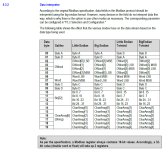ganutenator
Lifetime Supporting Member
I am finally lucky enough to work w/ an actual high level programmer.
I can follow a tag from the pnp junction up to an hmi.
He knows the other side.
He often jokes that together, we actually make a good programmer.
He is starting to dive into the home made hmi aspect and data collection.
I'm explaining everything I know about modbus tcp to him.
I have to hold laughter back when I state things like: It's an open protocol.
Then he asks why 4X:12,289 equates to %MW1 or 40001 or 40002 et al.
It's just a serial modbus msg wrapped in a packet in a pocket in a socket....
I can follow a tag from the pnp junction up to an hmi.
He knows the other side.
He often jokes that together, we actually make a good programmer.
He is starting to dive into the home made hmi aspect and data collection.
I'm explaining everything I know about modbus tcp to him.
I have to hold laughter back when I state things like: It's an open protocol.
Then he asks why 4X:12,289 equates to %MW1 or 40001 or 40002 et al.
It's just a serial modbus msg wrapped in a packet in a pocket in a socket....







